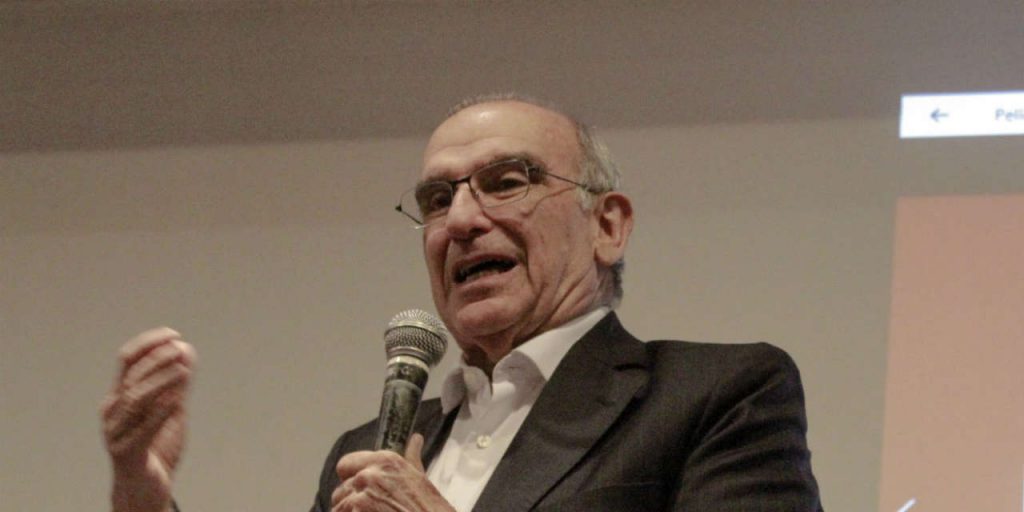Former Vice-President Humberto de la Calle was the lead negotiator for the Colombian government in the peace talks with FARC guerrillas.
Early life
Born on July 14, 1946 in the small central province of Caldas, de la Calle’s early childhood bore witness to one of Colombia’s most violent periods. From 1948 to 1958 Colombia went through a period of civil war, known as “La Violencia”, that claimed the lives of close to 200,000 people across the country.
A precocious student, de la Calle studied law at the University of Caldas. In 1978 he began teaching law, eventually training aspiring lawyers at his old alma mater. De la Calle also took up senior posts at the University of Manizales and the University of the Andes of Bogota. In his mid-thirties, he went on to specialize in International Law at the Inter-American Judicial Committee.
Entry into public life
In 1986, De la Calle was appointed as a magistrate to the Supreme Court. From 1990 to 1992, the rising star then served in the ministry of President Cesar Gaviria (1990-1994) of the Liberal Party.
It is worth noting that these promotions took place during a time of extreme violence in Colombia. Drug trafficking organizations, such as Pablo Escobar’s Medellin Cartel, frequently made good on their promises to assassinate judges and political figures that did not comply with their wishes.
Vice presidency
In 1993, at the urging of his Liberal Party colleagues, De la Calle ran as a candidate in the upcoming presidential race. While he was soundly defeated in the primaries, the eventual winner, Ernesto Samper, chose De la Calle as his running mate.
Months after his inauguration in 1994, evidence emerged suggesting that President Samper had accepted money from the Cali Cartel to help finance his presidential campaign. While Samper was never formally convicted, the scandal, known as “Proceso 8,000”, severely damaged his relationship with the electorate and the United States.
After failing to convince his boss to step down, De la Calle submitted his own letter of resignation. He left the vice-presidency in 1997.
Post-vice presidency
Displaying his considerable political nous, De la Calle quickly tried to distance himself from the disgraced presidency of Ernesto Samper. Following his resignation as vice president, De la Calle allied himself with Conservative politican Andres Pastrana. When Pastrana won the 1998 election he appointed De la Calle as his ambassador to the United Kingdom. He later served as Minister of the Interior (1998-2000) and as Colombia’s Ambassador to the Organization of American States (2001-2003).
Capitalizing on his experience in government and extensive list of contacts, De la Calle later moved into the private sector, where he again practised law. He also wrote regular opinion columns for newspaper El Espectador.
Negotiator in peace talks
In 2012, President Juan Manuel Santos offered De la Calle an opportunity to return to the forefront of Colombian politics.
On August 27, Santos formally announced that his government had begun exploratory peace talks with FARC guerrillas in February. He later named the 66-year-old De la Calle as the lead negotiator for the Colombian government.
The latest attempt at peace with FARC was inaugurated on October 18, 2012 in Norway. During the opening press conference De la Calle took center stage setting forth his optimism for the talks.
He said that FARC guerrillas should not abandon their ideals and principles but rather, “that they express them without the use of weapons.” The chief negotiator also made clear that while the government was willing to find a compromise, the socioeconomic model of Colombia would not be up for debate.
He played a vital role in the peace talks meeting twice with the FARC’s top leader, “Timochenko”. The peace deal between the government and the guerrilla group was ratified on November 30, 2016.
Presidential bid
De la Calle ran for president on a Liberal Party ticket in the 2018 elections, but without success. The former peace negotiator failed to reach the second round.


